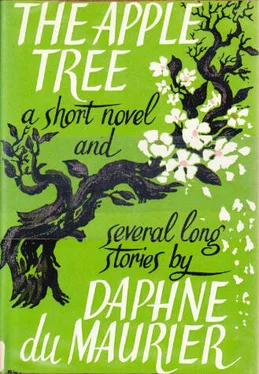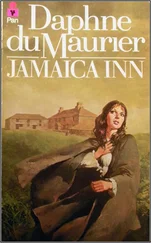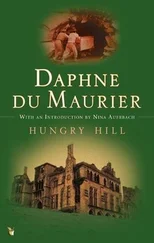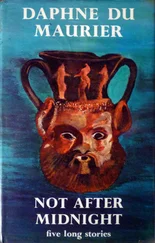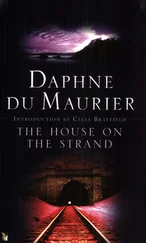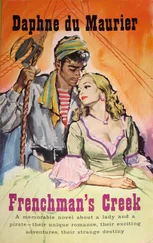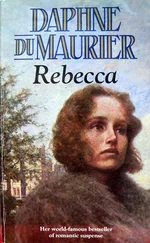Daphne du Maurier - The Apple Tree - a short novel & several long stories
Здесь есть возможность читать онлайн «Daphne du Maurier - The Apple Tree - a short novel & several long stories» весь текст электронной книги совершенно бесплатно (целиком полную версию без сокращений). В некоторых случаях можно слушать аудио, скачать через торрент в формате fb2 и присутствует краткое содержание. Жанр: Современная проза, Триллер, Социально-психологическая фантастика, на английском языке. Описание произведения, (предисловие) а так же отзывы посетителей доступны на портале библиотеки ЛибКат.
- Название:The Apple Tree: a short novel & several long stories
- Автор:
- Жанр:
- Год:неизвестен
- ISBN:нет данных
- Рейтинг книги:5 / 5. Голосов: 1
-
Избранное:Добавить в избранное
- Отзывы:
-
Ваша оценка:
- 100
- 1
- 2
- 3
- 4
- 5
The Apple Tree: a short novel & several long stories: краткое содержание, описание и аннотация
Предлагаем к чтению аннотацию, описание, краткое содержание или предисловие (зависит от того, что написал сам автор книги «The Apple Tree: a short novel & several long stories»). Если вы не нашли необходимую информацию о книге — напишите в комментариях, мы постараемся отыскать её.
The Apple Tree: a short novel & several long stories — читать онлайн бесплатно полную книгу (весь текст) целиком
Ниже представлен текст книги, разбитый по страницам. Система сохранения места последней прочитанной страницы, позволяет с удобством читать онлайн бесплатно книгу «The Apple Tree: a short novel & several long stories», без необходимости каждый раз заново искать на чём Вы остановились. Поставьте закладку, и сможете в любой момент перейти на страницу, на которой закончили чтение.
Интервал:
Закладка:
Daphne du Maurier
The Apple Tree: a short novel & several long stories
Monte Verità
THEY TOLD ME afterwards they had found nothing. No trace of anyone, living or dead. Maddened by anger, and I believe by fear, they had succeeded at last in breaking into those forbidden walls, dreaded and shunned through countless years — to be met by silence. Frustrated, bewildered, frightened, driven to fury at the sight of those empty cells, that bare court, the valley people resorted to the primitive methods that have served so many peasants through so many centuries: fire and destruction.
It was the only answer, I suppose, to something they did not understand. Then, their anger spent, they must have realised that nothing of any purpose had been destroyed. The smouldering and blackened walls that met their eyes in the starry, frozen dawn had cheated them in the end.
Search parties were sent out, of course. The more experienced climbers amongst them, undaunted by the bare rock of the mountain summit, covered the whole ridge, from north to south, from east to west, with no result.
And that is the end of the story. Nothing more is known.
Two men from the village helped me to carry Victor's body to the valley, and he was buried at the foot of Monte Verità. I think I envied him, at peace there. He had kept his dream.
As to myself, my old life claimed me again. The second war churned up the world once more. Today, approaching seventy, I have few illusions; yet often I think of Monte Verità and wonder what could have been the final answer.
I have three theories, but none of them may be true.
The first, and the most fantastic, is that Victor was right, after all, to hold to his belief that the inhabitants of Monte Verità had reached some strange state of immortality which gave them power when the hour of need arrived, so that, like the prophets of old, they vanished into the heavens. The ancient Greeks believed this of their gods, the Jews believed it of Elijah, the Christians of their Founder. Throughout the long history of religious superstition and credulity runs this ever-recurrent conviction that some persons attain such holiness and power that death can be overcome. This faith is strong in eastern countries, and in Africa; it is only to our sophisticated western eyes that the disappearance of things tangible, of persons of flesh and blood, seems impossible.
Religious teachers disagree when they try to show the difference between good and evil: what is a miracle to one becomes black magic to another. The good prophets have been stoned, but so have the witch-doctors. Blasphemy in one age becomes holy utterance in the next, and this day's heresy is tomorrow's credo.
I am no great thinker, and never have been. But this I do know, from my old climbing days: that in the mountains we come closest to whatever Being it is that rules our destiny. The great utterances of old were given from the mountain tops: it was always to the hills that the prophets climbed. The saints, the messiahs, were gathered to their fathers in the clouds. It is credible to me, in my more solemn moods, that the hand of magic reached down that night to Monte Verità and plucked those souls to safety.
Remember, I myself saw the full moon shining upon that mountain. I also, at midday, saw the sun. What I saw and heard and felt was not of this world. I think of the rock-face, with the moon upon it; I hear the chanting from the forbidden walls; I see the crevasse, cupped like a chalice between the twin peaks of the mountain; I hear the laughter; I see the bare bronzed arms outstretched to the sun.
When I remember these things, I believe in immortality…
Then — and this is perhaps because my climbing days are over, and the magic of the mountains loses its grip over old memories, as it does over old limbs — I remind myself that the eyes I looked into that last day on Monte Verità were the eyes of a living, breathing person, and the hands I touched were flesh.
Even the spoken words belonged to a human being. "Please do not concern yourself with us. We know what we must do." And then that final, tragic word, "Let Victor keep his dream."
So my second theory comes into being, and I see nightfall, and the stars, and the courage of that soul which chose the wisest way for itself and for the others; and awhile I returned to Victor, and the people from the valley gathered themselves together for the assault, the little band of believers, the last company of those seekers after Truth, climbed to that crevasse, between the peaks, and so were lost.
My third theory is one that comes to me in moods more cynical, more lonely, when, having dined well with friends who mean little to me, I take myself home to my apartment in New York. Looking from the window at the fantastic light and colour of my glittering fairy-world of fact that holds no tenderness, no quietude, I long suddenly for peace, for understanding. Then, I tell myself, perhaps the inhabitants of Monte Verità had long prepared themselves against departure, and when the moment came it found them ready, neither for immortality nor for death, but for the world of men and women. In stealth, in secret, they came down into the valley unobserved, and, mingling with the people, went their separate ways. I wonder, looking down from my apartment into the hub and hustle of my world, if some of them wander there, in the crowded streets and subways, and whether, if I went out and searched the passing faces, I should find such a one and have my answer.
Sometimes, when travelling, I have fancied to myself, in coming upon a stranger, that there is something exceptional in the turn of a head, in the expression of an eye, that is at once compelling and strange. I want to speak, and hold such a person instantly in conversation, but — possibly it is my fancy — it is as though some instinct warns them. A momentary pause, a hesitation, and they are gone. It might be in a train, or in some crowded thoroughfare, and for one brief moment I am aware of someone with more than earthly beauty and human grace, and I want to stretch out my hand and say, swiftly, softly, "Were you among those I saw on Monte Verità?" But there is never time. They vanish, they are gone, and I am alone again, with my third theory still unproven.
As I grow older — nearly seventy, as I have said, and memory shortens with the lengthening years — the story of Monte Verità becomes more dim to me, and more improbable, and because of this I have a great urge to write it down before memory fails me altogether. It may be that someone reading it will have the love of mountains that I had once, and so bring his own understanding to the tale, his own interpretation.
One word of warning. There are many mountain peaks in Europe, and countless numbers may bear the name of Monte Verità. They can be found in Switzerland, in France, in Spain, in Italy, in the Tyrol. I prefer to give no precise locality to mine. In these days, after two world wars, no mountain seems inaccessible. All can be climbed. None, with due caution, need be dangerous. My Monte Verità was never shunned because of diiliculties of height, of ice and snow. The track leading to the summit could be followed by anyone of sure and certain step, even in late autumn. No common danger kept the climber back, but awe and fear.
I have little doubt that today my Monte Verità has been plotted upon the map with all the others. There may be resting camps near the summit, even an hotel in the little village on the eastern slopes, and the tourist lifted to the twin peaks by electric cable. Even so, I like to think there can be no final desecration, that at midnight, when the full moon rises, the mountain face is still inviolate, unchanged, and that in winter, when snow and ice, great wind and drifting cloud make the climb impassable to man, the rock-face of Monte Verità, her twin peaks lifted to the sun, stares down in silence and compassion upon a blinded world.
Читать дальшеИнтервал:
Закладка:
Похожие книги на «The Apple Tree: a short novel & several long stories»
Представляем Вашему вниманию похожие книги на «The Apple Tree: a short novel & several long stories» списком для выбора. Мы отобрали схожую по названию и смыслу литературу в надежде предоставить читателям больше вариантов отыскать новые, интересные, ещё непрочитанные произведения.
Обсуждение, отзывы о книге «The Apple Tree: a short novel & several long stories» и просто собственные мнения читателей. Оставьте ваши комментарии, напишите, что Вы думаете о произведении, его смысле или главных героях. Укажите что конкретно понравилось, а что нет, и почему Вы так считаете.
